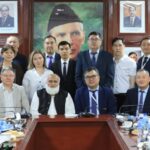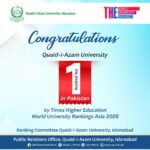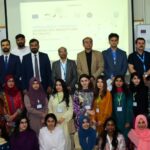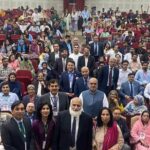workshop on “Great Powers in South Asia: Implications for Pakistan”
A two-day workshop on “Great Powers in South Asia: Implications for Pakistan” was held at the Defense and Strategic Studies Department, Quaid-i-Azam University with an aim to examine the impact of interaction of the great powers with the regional players and its effects on the region particularly for Pakistan.
The workshop was jointly organized by the teaching department and the United States Institute of Peace (USIP), Washington DC.
Dr. Rifaat Hussain, Chairperson of DSS Department, in his introductory remarks stated the principle idea behind the workshop. He said the relations amongst great powers, namely USA, Russia and Peoples Republic of China are undergoing a qualitative change and this transition has profound strategic consequences not only for South Asia but also for Pakistan.
The Chairperson highlighted different factors that affect the regional dynamics, namely protracted conflicts, proliferation, poverty, people in terms of demographic potential, and lastly the promise and potential of conflict resolution.
He said the scope and density of global interactions have brought about complex and multidimensional patterns of amity and enmity between political actors that would cast an impact on Pakistan. “A well thought strategy is inevitable for Pakistan to conduct itself as a pivotal state in the region as well as in the triangular great power’s relationship” he added.
Former ambassador Ali Sarwar Naqvi in his presentation outlined the US role in South Asia. He said that US considers India and Pakistan both as important geopolitical players in the region, however, its tilt towards India is more than an institutionalized engagement, and in this bid has altered its stance on Kashmir as well. “With strategic, political, commercial interests of the two countries coinciding with each other, US in its quest for new global opportunities is de-hyphenating India and Pakistan” said former ambassador.
Institute of Strategic Studies, Director General, Ambassador (Retd) Tanvir A Khan in his presentation on Russia and South Asia outlined in detail the often misperceived and misread Soviet and then Russian engagement with Pakistan and how the developments soon after the creation of Pakistan, made the policy makers to opt for the US alliance system, than the Soviet.
He said India benefited immensely from the barter trade and Rupee Ruble exchange system introduced by the Soviets to win India as a key partner during the Cold War. “The relationship also proved very beneficial for India to emerge as economic power in the post Cold War period” he added.
Former foreign secretary senator Akram Zaki and Prof Zou, Rong from Guang Ming daily of China talked about China as the third and very important regional player in the region.The workshop coordinator, Salma Malik assistant professor at the DSS department, also highlighted the importance of South Asia.
 PM’s Laptop Scheme’s Provisional List has been shared with Department Focal Person. Check your status, please
PM’s Laptop Scheme’s Provisional List has been shared with Department Focal Person. Check your status, please








